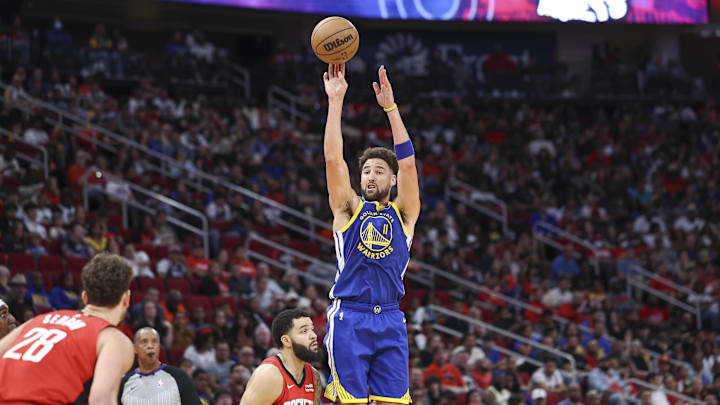The Golden State Warriors season is off to a strong start. Chris Paul looks right at home. Draymond Green and Andrew Wiggins will need time to get up to speed, but the bench unit is rock-solid. Jonathan Kuminga and Moses Moody are teasing leaps. Dario Saric has been waiting his whole career to play in a system like this.
In short, the signs are positive.
In Sunday's 106-95 win over the Houston Rockets, it was Klay Thompson who made the storylines. His performance wasn't anything out of the ordinary — 19 points, four rebounds, 7-of-12 from the field, 5-of-10 from the deep. That's what Thompson does. He's one of the most prolific and efficient perimeter snipers in league history.
But, that's exactly why Sunday was a night to remember. Because Thompson made history, moving into the No. 10 spot on the all-time 3-pointers made list, surpassing sixth-man savant Jamal Crawford.
Rank | Name | 3PM |
|---|---|---|
1 | Stephen Curry | 3,407 |
2 | Ray Allen | 2,973 |
3 | James Harden | 2,754 |
4 | Reggie Miller | 2,560 |
5 | Kyle Korver | 2,450 |
6 | Damian Lillard | 2,393 |
7 | Vince Carter | 2,290 |
8 | Jason Terry | 2,282 |
9 | LeBron James | 2,266 |
10 | Klay Thompson | 2,223 |
It happened in classic fashion, with Thompson flying full speed into a transition 3 off the dish from his fellow Splash Brother.
With this 3-pointer Klay Thompson passed Jamal Crawford for 10th on the NBA's All-Time Made 3-point list 🙌pic.twitter.com/r1DPVRjDjG
— ClutchPoints (@ClutchPoints) October 30, 2023
So, with Thompson officially part of the 3-point inner circle, the question remains — how high can he climb all-time?
Klay Thompson breaks into all-time top 10 in 3-pointers made
It is best to view the top 10 list as a constantly evolving organism. A few of the big names are set in stone — Allen, Miller, Korver, Carter, Terry — but half the list is still active. Thompson isn't racing toward a stationary target here.
Curry will finish No. 1, that much feels certain. Assuming James Harden has a few more years left in the tank, he's going to pass Allen for the second spot. Damian Lillard is on that trajectory as well. Harden made 161 last season. Lillard made 244.
It would be extremely reasonable to peg Harden and Lillard, in either order, as the future No. 2 and No. 3, with your prediction based mostly on the prediction of career longevity. Harden is a year older with a lower expected volume at this point in their respective journeys. Lillard's skill set should translate better to secondary stardom and advanced age. Harden's best attribute right now is probably his playmaking off drives. Lillard's game is still rooted in heavy 3-point volume.
So, let's get adventurous. Let's say Harden has at least four years and another ~400 triples in his back pocket. Lillard might stretch it a little longer — he can break out ~700 more over the next four years. Thompson would have to beat Allen, Harden, and Lillard to break into second place behind Steph.
Then, there's the LeBron consideration. James could retire at season's end, short of Thompson (James made 121 triples last season, Thompson led the NBA with 301). He could play one more year to join his son, Bronny. He could try to pull a Tom Brady and play until he's 45, which the Lakers would surely oblige. If anybody's capable of dragging it out that long, James is.
He's a real wild card as a result. Thompson should maintain a healthy year-to-year volume advantage over James for as long as Thompson continues to operate as a 30-plus-minute starter. Thompson clearly expects a lengthy max contract next summer, so the expectation is that Thompson will continue to get up a healthy volume of shots, barring injury, for the next few years.
Of course, the inevitable decline also factors into the equation. Lillard and Harden are both defensive negatives whose shortcomings will only become more pronounced with age. Thompson doesn't even have the on-ball equity or playmaking acumen to back up his stock. He has already declined rather significantly as a defender. Thompson should continue to provide value as a movement shooter until he hangs 'em up, but there is valid concern about his ability to provide "max starter" value two, three, or four years down the road.
For now, we can put Thompson on a similar track to Lillard and Harden. Thompson's volume will probably skew more toward Lillard's high-water mark. Thompson probably won't lead the league in 3s every season, especially if his minutes start to tick downward, but he's a special shot-maker. That's not going to change. On a fundamental level, he may just be the greatest shooter in league history.
So, let's say Thompson retires after his next contract — somewhere in the ballpark of five years from now, around 38 years of age. Let's say he can approximate his career average of 201.2 triples per season (that includes his rookie campaign and injury-shortened seasons, but it's naive to think Thompson will never miss a significant chunk of games again). That adds another 1,000, give or take a few, to his career total.
If Thompson can break the 3,000 mark, and even creep up toward Curry's current number, he could very well end his career in the No. 2 spot all-time. His primary competition will come from the active player pool — primarily Harden, Dame, and LeBron, with an understanding that the younger generation is coming around eventually.
Let's put a hard prediction at No. 2 because that feels right. Even if there is an inherent risk in such a prediction since there's so much volatility around Thompson's future with Golden State and what his next contract will even look like.
